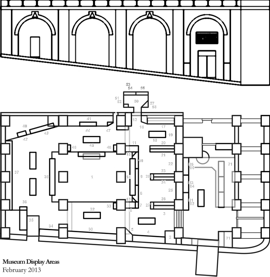Joseph Grimaldi puppets: Difference between revisions
(+cat) |
BTMM Gillian (talk | contribs) No edit summary |
||
| Line 1: | Line 1: | ||
{{Exhibit|Loc=81}} | {{Exhibit|Loc=81}} | ||
'''Joseph Grimaldi''' (1778-1837) was possibly England’s basis for '''Mr Punch.''' | '''Joseph Grimaldi''' (1778-1837) was possibly England’s basis for '''Mr Punch.''' He was the first modern clown, introducing the idea of the pantomime dame and the concept of the tragic-comic clown. Grimaldis style of clowning was influenced by the Italian Commedia dell Arte of the 16th century, reflecting the complexities of the modern era. Of his own name he punned 'I am grim all day - but I make you laugh at night!' | ||
His career began at the age of three at the Sadler's Wells Theatre, and his debut at Covent Garden was in 'Harlequin and Mother Goose; or the Golden Egg' in 1806. The lack of great theatrical scenes allowed Grimaldi to project himself to the fore, receiving a great deal of praise from the critics of the day. In 1812 he donned the skirts of Queen Ronabellyana in 'Harlequin and the Red Dwarf'. He was later to play the Baroness in 'Harlequin and Cinderella', and it could be said that he began the slow transition from clown to pantomime dame, although the 'Dame' was not to fully emerge until the period from 1860-1880 with the emergence of the music hall stars. | |||
Grimaldi made famous several songs, the most popular of which was 'Hot Codlins'. The song tells of an old lady who sold roast apples and drank too much gin. | |||
'A little old woman, her living she got by selling codlins, hot, hot, hot. And this little old woman, who codlins sold, tho' her codlins were not, she felt herself cold. So to keep herself warm she thought it no sin to fetch for herself a quartern of ........' | |||
The audience shouted out the last word with glee, as Grimaldi would look at them in mock disgust and say 'Oh! For Shame!' This song continued to delight pantomime audiences over the years. | |||
In 1823 Joseph Grimaldi was forced to retire, through ill health and exhaustion, at the age of 45. After years of acrobatic jumping and tumbling, he was scarcely able to walk. By 1828 he had become penniless, and a benefit performance was held at both Sadlers Wells, and Covent Garden. These benefit performances proved to be of great help during his final years, which were spent by the fireplace of The Marquis of Cornwallis Tavern in Pentonville. To this day he is commemorated annually by clowns in the Holy Trinity church in Dalston, East London. | |||
Grimaldi was famous as '''Harlequin''' in the pantomimes at '''Covent Garden Theatre Royal''' (now the '''Royal Opera House'''). This puppet (circa 1815) is made for a child - it is far too small for an adult’s hand. | Grimaldi was famous as '''Harlequin''' in the pantomimes at '''Covent Garden Theatre Royal''' (now the '''Royal Opera House'''). This puppet (circa 1815) is made for a child - it is far too small for an adult’s hand. | ||
| Line 10: | Line 20: | ||
[[Category:Punch and Judy]] | [[Category:Punch and Judy]] | ||
[[Category:Puppets]] | [[Category:Puppets]] | ||
==References== | |||
[http://www.its-behind-you.com/grimaldi.html, Brief Biography of Joseph Grimaldi] | |||
Revision as of 11:31, 26 January 2012
| Exhibit |
|---|
Joseph Grimaldi puppets |
 |
| location: |
|
Arch One , Area 81 Glamour of Brighton |
Joseph Grimaldi (1778-1837) was possibly England’s basis for Mr Punch. He was the first modern clown, introducing the idea of the pantomime dame and the concept of the tragic-comic clown. Grimaldis style of clowning was influenced by the Italian Commedia dell Arte of the 16th century, reflecting the complexities of the modern era. Of his own name he punned 'I am grim all day - but I make you laugh at night!'
His career began at the age of three at the Sadler's Wells Theatre, and his debut at Covent Garden was in 'Harlequin and Mother Goose; or the Golden Egg' in 1806. The lack of great theatrical scenes allowed Grimaldi to project himself to the fore, receiving a great deal of praise from the critics of the day. In 1812 he donned the skirts of Queen Ronabellyana in 'Harlequin and the Red Dwarf'. He was later to play the Baroness in 'Harlequin and Cinderella', and it could be said that he began the slow transition from clown to pantomime dame, although the 'Dame' was not to fully emerge until the period from 1860-1880 with the emergence of the music hall stars.
Grimaldi made famous several songs, the most popular of which was 'Hot Codlins'. The song tells of an old lady who sold roast apples and drank too much gin. 'A little old woman, her living she got by selling codlins, hot, hot, hot. And this little old woman, who codlins sold, tho' her codlins were not, she felt herself cold. So to keep herself warm she thought it no sin to fetch for herself a quartern of ........'
The audience shouted out the last word with glee, as Grimaldi would look at them in mock disgust and say 'Oh! For Shame!' This song continued to delight pantomime audiences over the years.
In 1823 Joseph Grimaldi was forced to retire, through ill health and exhaustion, at the age of 45. After years of acrobatic jumping and tumbling, he was scarcely able to walk. By 1828 he had become penniless, and a benefit performance was held at both Sadlers Wells, and Covent Garden. These benefit performances proved to be of great help during his final years, which were spent by the fireplace of The Marquis of Cornwallis Tavern in Pentonville. To this day he is commemorated annually by clowns in the Holy Trinity church in Dalston, East London.
Grimaldi was famous as Harlequin in the pantomimes at Covent Garden Theatre Royal (now the Royal Opera House). This puppet (circa 1815) is made for a child - it is far too small for an adult’s hand.


